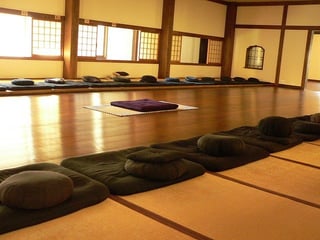
Max Hermann begins his famous poem, "Desiderata," with this piece of wonderful advice: “Go placidly amid the noise and haste and remember what peace there may be in silence.”
How many of us have paused momentarily in our frantic schedules to think that same thought? How many of us feel pressed by the busyness and noise and long for more peace and silence in our lives?
Perhaps that is what draws so many people, including me, to silent meditation retreats. On January 1st, I’m departing for my second annual week-long silent meditation retreat in western Maryland. Whenever I tell people about the experience, there are always a few questions (sometimes more than a few)! And the experience has been so challenging and strengthening and focusing that — whether you are deeply curious about going on a silent meditation retreat or can’t begin to fathom the appeal — I’m sharing a few answers to commonly-asked questions before I leave on the retreat.
The first question people ask: Are you really silent for an entire week?
The answer is “yes and no.” Meditation silence (sometime referred to as “noble silence”) means more than just a “no-talking” policy. The rules of silence include no eye contact, or non-verbal communication, minimizing all sounds including footsteps, doors closing, eating utensils scraping plates, chairs scraping floors…you get the idea.
Each silent meditation retreat is a little different. At the one I attend, we spend an hour every morning chanting prayers of gratitude for being alive, for the miracle of the world, for the greatness of the Divine Presence (however you conceive it to be) and for the blessing of our five senses and human experience. Once a day, I teach a 45-minute yoga class which requires me to talk and others to listen, but I teach the same sequence every day so that after the second day fewer words are needed. The attendees also take turns working in the kitchen which requires a few words in passing from time to time. Also, in the first two days, the leaders of the retreat allow for ten minutes of Q&A and each participant meets with one of the leaders at least once during the seven days for a 30-minute check-in.
#2 Why is there a check-in at a silent retreat and what is that like?
A lot of interesting thoughts and feelings emerge during a week of silence because it turns out that the world of noise and haste offers endless opportunities to hide unpleasantries from yourself. By hiding, I mean that we repress unpleasant emotions, memories or thoughts—send them to back reaches of our consciousness—like old files in the back of the cabinet. And through busyness we keep those hidden thoughts out of reach. However, when you sit in silence for day after day, slowly the shadows of the inner consciousness roll back and the doors of escape (reading, writing, watching television, listening to music, checking your email, surfing the internet, getting work done, talking to other people, cleaning your house or car…all these things and more) are not available. It’s just you sitting there with eyes closed and unpleasant thoughts.
Things can get pretty raw. Last year I broke down in tears while I met with one of the leaders and told him I was realizing how mean I could be to myself.
The experience is a bit like cleaning out a very old closet. You go through all the stuff that’s accumulated and gotten stuffed in the back for decades, and in the end the space is more organized and you’re ready to get rid of some thoughts and ideas which no longer serve you.
#3 What’s the hardest part of the silent retreat?
Being completely off the grid for a week away from family and work is the hardest part for me. At the same time, though, that’s also the most restorative part. Although I miss connecting with my kids and my close friends, I find that the week off gives me the most refreshing rest. That said, some of my family members and friends don’t understand or appreciate not being able to reach me for an entire week. My father likes to speak with me every day and he gets somewhat angry about the whole idea. My kids miss me.
The retreat helps me make the distinction between self-care and selfish isolation. I don’t feel guilty while I’m on the retreat because I know that meditation allows me to be more patient, compassionate, balanced and accepting. And everyone I interact with on my return will notice the difference and (hopefully) be grateful for the change.
Last question: Why would you recommend a silent retreat?
There are few experiences in life which really force us to confront our true self. Too often it takes a crisis such as a death, loss of a significant relationship or a job before we decide to take a serious inventory of our inner life. A silent meditation retreat offers you the opportunity to be truly alone with yourself without distraction. It’s both an incredible challenge and tremendously rewarding. It’s a process to go through which in the end leaves you feeling lighter, more centered and more peaceful.
If you have other thoughts or questions about meditation retreats, or just want to share your experiences with silence, I’d love to hear them! I’ll be back from the retreat this weekend and you can either leave a comment in the comments section or drop me a line here.
Also, if you find the idea of a silent meditation retreat appealing, the website retreatfinder.com lists between 200 and 400 meditation retreats worldwide with approximately one-third designated as silent retreats.
Meditation Studio: CC BY 2.0 Image: Image by M Dougan https://www.flickr.com/photos/10582945@N02/1710123260




